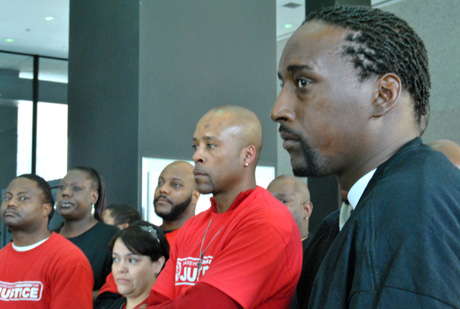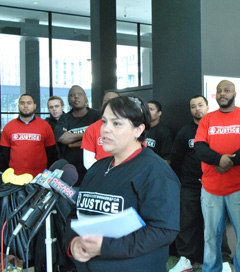Unseen but ever present, behind the well-stocked shelves of Walmarts around the country are warehouse workers. This labor force is primarily employed by contracting firms that underpay workers and fire them summarily, according to advocates, but a group of 60 former employees at a Walmart warehouse in the Chicago suburbs are holding these contractors accountable for what they say are numerous labor violations.
The workers allege that, after they filed a complaint in November 2011 calling for lost wages from their temp employer, Eclipse, they were dismissed without notice when Schnieder Logistics, the company that operates the Walmart warehouse in Elmwood, Illinois, canceled their temp agency's contract.

(Photo: Yana Kunichoff / Truthout)
The firing was in retaliation for standing up for their wages, say the workers, and they are now filing a lawsuit under the Worker Adjustment and Retraining Notification Act (WARN) because they were fired without the 60-days notice required by federal law, targeting both Eclipse and Schnieder Logistics.
“Walmart has an ethical standards policy they apply to all contractors. Eclipse violated those standards. After Walmart was alerted of this problem, we got fired,” said Terence Smith, a former worker at the warehouse, during a press conference before the filing of the WARN lawsuit. “We didn't do anything but stand up for what is legal and fair. Walmart needs to take responsibility for this and make things right.”
The 60 workers were fired on December 31, 2011, after working a full shift during the busy holiday season, when Schnieder Logistics ended its contract with their temp agency. Prior to that, the temp agency was paying the workers only $4.62 an hour, well below the Illinois minimum wage of $8.25.
Though the workers carried Walmart's merchandise inside a warehouse owned by the company, they were officially employed by the two other companies, leaving Walmart without any liability for bad labor practices in its warehouses.
But Chris Williams, an attorney with the Working Hands Legal Clinic representing the workers, said that “it's an open question if Walmart bears responsibility [as it] benefits from their labor.”
This is not the first time the big-box store has come under attack for its labor standards: it has previously come under fire for not providing health insurance for more than half of its employees; paying unlivable, low wages; blocking union-organizing efforts; and was sued for gender discrimination.
“Walmart is one of the worst” in how it treats its warehouse workers, says Leah Fried, an organizer with Warehouse Workers for Justice, but the industry in general is ripe with abuses.
“Bad Jobs in Goods Movement,” a series of interviews conducted with warehouse workers in Will County, Illinois, by Warehouse Workers for Justice, found that most warehouse workers are temp workers that are paid wages which barely keep them above the poverty lines, and they receive no benefits.
Temp work, or “perma-temp work,” as Fried calls it, is “a dangerous employment model for workers.”
“Temp is a fiction designed to deny them [workers] benefits,” said Williams, the workers' attorney.
And it's one that is becoming increasingly common. More than 70 percent of Chicagoland warehouses employ temporary workers, the study found, and Will County has more temp agencies than any other county in the state.
But the warehouse workers have a precedent for their fight – in November, California fined Walmart staffing agency contractors more than $1 million for wage and hour violations in a warehouse similar to the one in which the Illinois workers were previously employed.
Chicago was also home to one of the most infamous battles around the WARN Act. The Republic Windows and Doors factory occupation, launched after workers were told that their factory would be closing and they would not receive any sick time or vacation days, lasted for six days. Workers eventually received their severance pay, health care benefits and back pay.
Will this case come to that?
“In the warehouse industry, workers are getting more and more frustrated, more and more angry,” said Williams. “I can't speak for these workers, but it could be more common.”
Schneider and Eclipse now have 60 days to respond to the WARN lawsuit filed by the former Walmart workers.
Until then, the workers will continue fighting, says former Eclipse employee Leticia Rodriguez.
“Losing our job from one moment to the next” has been difficult,” said Rodriguez, who lives in Joliet, Illinois, with two daughters. “We are trying to fight for our rights.”
Press freedom is under attack
As Trump cracks down on political speech, independent media is increasingly necessary.
Truthout produces reporting you won’t see in the mainstream: journalism from the frontlines of global conflict, interviews with grassroots movement leaders, high-quality legal analysis and more.
Our work is possible thanks to reader support. Help Truthout catalyze change and social justice — make a tax-deductible monthly or one-time donation today.
